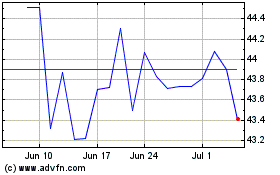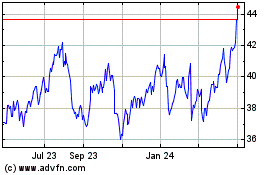By Simon Clark and Margot Patrick
LONDON -- HSBC Holdings PLC said it would shed 35,000 jobs and
cut business lines and customer relationships across the U.S. and
Europe, the latest phase in a decade long retreat from global
ambitions to focus on its Asian heartland.
The planned overhaul of the U.K.-based bank, one of the world's
largest by assets, marks a significant step in a reorganization
that started in the wake of the global financial crisis. Founded in
Hong Kong in 1865, HSBC operates in 64 countries and territories
but makes half of its revenue in Asia.
HSBC said the scaling back will help free up $100 billion in
risk-weighted assets to reinvest into the faster-growing Asia and
Middle East regions.
The move comes as European economic growth continues to be
anemic, and political challenges destabilize HSBC's two main
markets, the U.K. and Hong Kong. Banks in Europe have been hobbled
by low and negative interest rates that have made lending
particularly challenging.
"It is a really big warning signal from HSBC," said Peter
Garnry, head of equity strategy at Saxo Bank.
HSBC, one of the U.K.'s dominant retail banks, is dealing with
uncertainty surrounding the country's departure from the European
Union. Meanwhile in Hong Kong, antigovernment protests, trade
tensions between the U.S. and China and the coronavirus are
weighing on business.
HSBC shares fell 5.6% Tuesday as investors braced for hefty
restructuring charges. The bank said it would suspend until 2022
buybacks of shares that had helped buoy the stock.
The restructuring is being led by Chief Executive Noel Quinn,
who took the job in August on an interim basis. Mr. Quinn is vying
for the permanent role of CEO, which the bank said would be decided
this year.
The revamp adds to a sweeping restructuring that began in 2011
and saw the bank exit most of Latin America. In the decades before
that, it had expanded across the world through acquisitions, many
of them ultimately unprofitable. HSBC, which has its French
business up for sale, didn't give details of additional planned
disposals.
HSBC will exit businesses "where necessary," Mr. Quinn said.
On Tuesday, the bank said net profit fell 53% to $5.97 billion
last year, hit by a goodwill impairment of $7.3 billion. It said it
expects to incur around $7.2 billion of costs related to the
restructuring in the next few years.
At the end of 2019, the bank employed 235,000 people.
Executives said London will remain a hub for the investment
bank, but increasingly will play a supporting role to operations in
Hong Kong and Singapore.
"We are going to move more of our investment banking and global
markets resources into Asia -- more of our sector specialists, more
of our product specialists. We are going to look to base in Hong
Kong and the rest of Asia," Mr. Quinn said in an interview. "We
will still have a presence in London but it's fair to say the mix
is going to change over the next two to three years."
HSBC's retail and commercial bank serving U.K. customers remains
"very important," Mr. Quinn said, adding that he expects it to
become increasingly tied to the rest of the world as the country
leaves the EU. In mainland Europe, the bank plans to reduce its
risk-weighted assets by 35%.
In its long-struggling U.S. arm, Mr. Quinn said HSBC would cut
assets in investment banking and markets by almost half, and shut
around 70 of its 229 branches. The retail bank will target
"internationally affluent" individuals across the country, Mr.
Quinn said.
"It will require a larger reduction in our branch network on the
East Coast," Mr. Quinn said. "We are going to be opening up more
branches in the international markets that are relevant to HSBC,
principally on the West Coast of America."
As of September, HSBC was the U.S.'s 14th-largest commercial
bank, according to Federal Reserve data, with around $181 billion
in assets. Mr. Quinn said he had considered putting the unit up for
sale but decided against it because the U.S. is a crucial part of
the bank's global network.
Turbulence at HSBC is sapping morale within the bank, with 58%
of employees saying they saw "the positive impact of our strategy"
in 2019, down from 67% in 2018, according to a poll conducted by
the lender.
In mainland China, HSBC has for years positioned itself to take
advantage of growing economic ties between the most populous nation
and the wider world. That integration is now challenged by the
trade conflict with the U.S.
Chairman Mark Tucker said HSBC has reduced its expectations for
Asian economic growth in 2020 as a result of the coronavirus
outbreak. The bank said loan losses could rise and revenue could
fall if the outbreak is prolonged.
"The agreement of a phase-one trade deal between China and the
U.S. is a positive step, but we remain cautious about the prospects
for a wider-ranging agreement given disagreements that still exist,
particularly over technology," Mr. Tucker said.
Mr. Quinn, formerly the global commercial-banking head at HSBC,
was elevated after Mr. Tucker decided new leadership was
needed.
Mr. Tucker brushed aside questions Tuesday about whether it made
sense for Mr. Quinn to announce a restructuring when he may not see
the changes through. He said the restructuring and the selection of
the new CEO were separate processes running in parallel.
The benefits of the restructuring will be evident largely from
2023 onward, said Citigroup analyst Ronit Ghose, who recommended
that investors sell HSBC shares.
Caitlin Ostroff contributed to this article.
Write to Simon Clark at simon.clark@wsj.com and Margot Patrick
at margot.patrick@wsj.com
(END) Dow Jones Newswires
February 18, 2020 16:34 ET (21:34 GMT)
Copyright (c) 2020 Dow Jones & Company, Inc.
HSBC (NYSE:HSBC)
Historical Stock Chart
From Mar 2024 to Apr 2024

HSBC (NYSE:HSBC)
Historical Stock Chart
From Apr 2023 to Apr 2024
